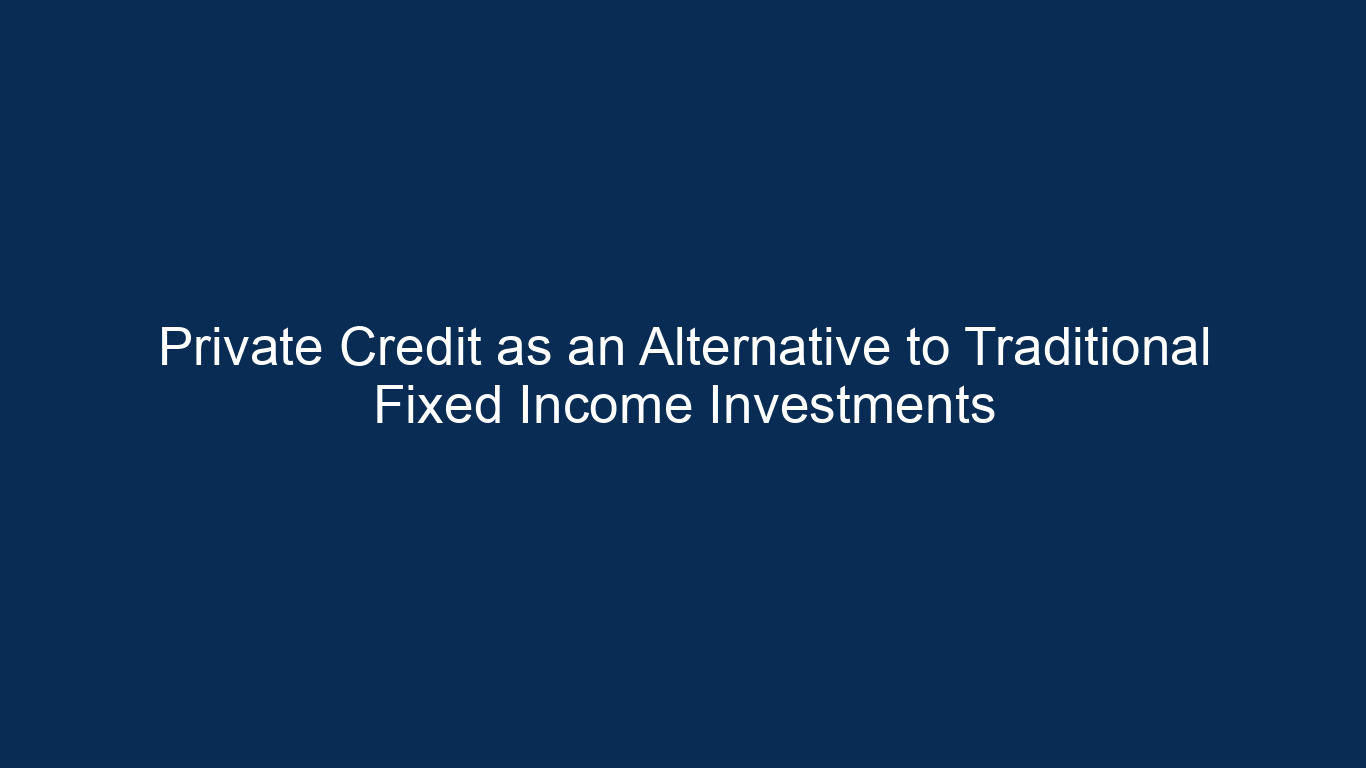Exploring the Benefits of Private Credit as an Alternative to Traditional Fixed Income Investments
Private credit is a type of investment that has gained popularity in recent years as an alternative to traditional fixed income investments. While traditional fixed income investments, such as bonds, have long been a staple in investors’ portfolios, private credit offers unique advantages that make it an attractive option for investors looking to diversify their holdings and potentially earn higher returns.
One of the primary benefits of private credit is the potential for higher returns compared to traditional fixed income investments. Private credit investments are typically made in non-publicly traded companies or projects, which can offer higher yields due to the increased risk associated with these investments. Unlike publicly traded bonds, private credit investments are not subject to the same level of market volatility, allowing investors to potentially earn higher returns without the same level of risk.
Additionally, private credit offers investors the opportunity to diversify their portfolios. Traditional fixed income investments are often limited to government or corporate bonds, which can be susceptible to similar economic factors and market conditions. Private credit investments, on the other hand, can span a wide range of sectors and industries, providing investors with exposure to different types of businesses and projects. This diversification can help to spread risk and reduce the correlation between investments, potentially enhancing overall portfolio performance.
Another advantage of private credit is the potential for consistent and stable income streams. While traditional fixed income investments typically offer regular interest payments, private credit investments often provide cash flows in the form of interest payments or principal repayments. These regular income streams can be particularly attractive to investors seeking a steady source of income, such as retirees or those looking to supplement their existing income.
Furthermore, private credit investments can offer investors greater control and transparency compared to traditional fixed income investments. When investing in private credit, investors often have the opportunity to directly engage with the borrower or project sponsor, allowing for a more active role in the investment process. This level of control can provide investors with greater insight into the underlying risks and potential returns of the investment, enhancing their ability to make informed decisions.
Finally, private credit investments can offer the potential for downside protection in times of economic uncertainty. Traditional fixed income investments are often impacted by changes in interest rates and market conditions, which can result in a decline in the value of the investment. Private credit investments, however, are often structured to be less sensitive to these external factors, providing investors with a degree of protection during periods of market volatility.
In conclusion, private credit offers a range of benefits as an alternative to traditional fixed income investments. From the potential for higher returns and diversification to consistent income streams, greater control, and downside protection, private credit can provide investors with unique advantages that may enhance their overall investment portfolios. As with any investment, it is important for investors to carefully assess their risk tolerance and conduct thorough due diligence before investing in private credit.
How Private Credit Can Help Diversify Your Fixed Income Portfolio
Private credit is becoming an increasingly popular investment option for diversifying fixed income portfolios. With its unique characteristics and potential for attractive returns, private credit can play a crucial role in balancing risk and enhancing overall portfolio performance. This article will explore how private credit can help diversify a fixed income portfolio, providing a formal and expository analysis of this investment strategy.
Private credit refers to loans or debt investments made to privately-held companies or individuals, as opposed to public companies that issue publicly-traded bonds. This distinction is important because private credit offers distinct advantages that can diversify a fixed income portfolio. One key advantage is the potential for higher yields compared to traditional fixed income investments, such as government or corporate bonds. Private credit investments often offer higher interest rates due to the increased risk associated with lending to non-public entities. This can provide a valuable source of income for investors seeking higher returns.
Another benefit of private credit is its lower correlation to the broader market. Unlike publicly-traded bonds, which are subject to market fluctuations and investor sentiment, private credit investments are typically less influenced by macroeconomic factors. This lower correlation can help reduce overall portfolio risk and enhance diversification. By adding private credit to a fixed income portfolio, investors can potentially mitigate the impact of market volatility and improve the stability of their investment returns.
Furthermore, private credit offers the potential for enhanced downside protection. In times of economic downturns or market distress, private credit investments may be less affected compared to other fixed income assets. This is because private credit often involves more direct lending arrangements, allowing investors to have greater control over the terms and conditions of the loans. This can include stronger collateral protection or more robust covenants, providing additional safeguards for investors in times of financial stress.
In terms of investment opportunities, private credit offers a wide range of options. Investors can choose from various strategies, such as direct lending, mezzanine financing, distressed debt, or venture capital. This flexibility allows investors to tailor their private credit exposure to their risk preferences and investment objectives. Additionally, private credit can provide access to sectors or companies that may not be easily accessible through traditional fixed income investments. This can further enhance portfolio diversification by introducing exposure to different industries and geographies.
However, it is important to note that private credit also has its own set of risks. Due diligence and careful analysis are crucial when evaluating potential private credit investments. Investors should consider factors such as the creditworthiness of the borrower, the quality of collateral, and the overall market conditions. Additionally, private credit investments can be illiquid, meaning they may not be easily bought or sold. This illiquidity can limit investors’ ability to quickly adjust their portfolios or access their invested capital.
In conclusion, private credit can be a valuable addition to a fixed income portfolio, offering diversification benefits and potential for attractive returns. Its unique characteristics, including higher yields, lower correlation to the broader market, enhanced downside protection, and flexible investment opportunities, make it an appealing option for investors seeking to balance risk and enhance overall portfolio performance. However, investors should carefully assess the risks and conduct thorough due diligence before incorporating private credit into their investment strategy.
The Rise of Private Credit: Why Investors are Turning to this Alternative Investment
Private credit, once considered a niche investment strategy, has gained significant traction in recent years as investors seek alternative avenues to generate returns. This growing interest can be attributed to several factors, including the current low-yield environment, increased regulation in traditional banking sectors, and the potential for attractive risk-adjusted returns. In this article, we will explore the rise of private credit as an alternative investment and analyze why investors are increasingly turning to this asset class.
Private credit refers to loans extended to companies or individuals by non-bank lenders, such as private equity firms, hedge funds, or specialized credit funds. Unlike traditional bank loans, private credit offers borrowers more flexibility in terms of loan structure, collateral requirements, and repayment terms. This flexibility allows private credit lenders to tailor their financing solutions to meet the unique needs of borrowers, thereby providing a competitive advantage over traditional lenders.
One of the primary reasons why investors are gravitating towards private credit is the current low-yield environment. With interest rates at historic lows, traditional fixed-income investments, such as government bonds or investment-grade corporate bonds, offer paltry returns. In contrast, private credit can provide higher yields due to the increased risk associated with lending to less creditworthy borrowers. This potential for enhanced returns makes private credit an attractive option for investors seeking to generate income in a low-yield environment.
Furthermore, increased regulation in the banking sector has led to a tightening of lending standards and a reduction in the availability of credit from traditional banks. This has created a financing gap for certain borrowers, particularly small and medium-sized enterprises (SMEs), who may not meet the strict criteria imposed by banks. Private credit fills this void by offering alternative financing options to these underserved borrowers, thereby fueling economic growth and job creation.
Additionally, private credit is often seen as a diversification tool within an investor’s portfolio. As an alternative asset class, private credit exhibits a low correlation with traditional equity and fixed-income investments. This low correlation can help investors reduce overall portfolio risk and enhance returns by adding an asset class that behaves differently from traditional investments.
Lastly, private credit offers the potential for attractive risk-adjusted returns. By conducting thorough due diligence and carefully selecting borrowers, private credit lenders can mitigate credit risk and generate compelling risk-adjusted returns. This focus on risk management is particularly crucial in an uncertain economic environment, where defaults and credit losses may increase. Consequently, investors are drawn to private credit as a way to potentially achieve superior returns while maintaining a level of risk control.
In conclusion, the rise of private credit as an alternative investment can be attributed to several factors, including the low-yield environment, increased regulation in traditional banking sectors, and the potential for attractive risk-adjusted returns. As investors seek alternative avenues to generate income and diversify their portfolios, private credit has emerged as an appealing option. However, it is essential for investors to carefully assess the risks associated with private credit and conduct thorough due diligence before committing capital to this asset class.
Unlocking Higher Returns: Leveraging Private Credit as a Fixed Income Strategy
Private credit has emerged as a popular fixed income strategy, offering investors the potential for higher returns in today’s low-interest-rate environment. This article will explore how investors can unlock these higher returns by leveraging private credit as a fixed income strategy.
Private credit refers to loans and debt investments made by non-bank financial institutions to companies or individuals. These loans are typically not publicly traded and are not subject to the strict regulations that govern traditional bank lending. This flexibility allows private credit investors to structure deals and negotiate terms that can potentially generate higher returns.
One of the key advantages of private credit is its potential to offer higher yields compared to traditional fixed income investments. In today’s low-interest-rate environment, many investors are struggling to find yield in traditional fixed income asset classes such as government bonds and investment-grade corporate bonds. Private credit offers an alternative investment that can potentially provide higher income through interest payments and fees associated with the loans.
Furthermore, private credit has the potential to provide diversification benefits to a fixed income portfolio. Traditional fixed income investments such as government bonds and investment-grade corporate bonds are typically highly correlated with interest rate movements. Private credit, on the other hand, is less sensitive to interest rate movements and can offer investors a source of return that is less dependent on interest rate fluctuations.
However, it is important to note that private credit is not without risks. Investing in private credit involves a higher degree of credit risk compared to traditional fixed income investments. Private credit investors are exposed to the creditworthiness of the borrower, and there is a risk of default or bankruptcy. Additionally, private credit investments can be illiquid, meaning they cannot be easily bought or sold on the secondary market. This lack of liquidity can pose challenges for investors who may need to access their funds quickly.
To effectively leverage private credit as a fixed income strategy, investors should consider several factors. First, they should carefully assess the creditworthiness of potential borrowers and conduct thorough due diligence before investing. This includes analyzing financial statements, assessing the borrower’s industry and competitive position, and evaluating the borrower’s ability to generate sufficient cash flow to service the debt.
Second, investors should carefully consider the structure and terms of the private credit investment. This includes evaluating the interest rate, maturity, collateral, and covenants associated with the loan. Investors should negotiate terms that protect their investment and mitigate potential risks.
Lastly, investors should consider diversifying their private credit investments to manage risk. This can be achieved by investing in a portfolio of loans across different industries, geographies, and borrower profiles. Diversification can help mitigate the risk of any individual loan defaulting or experiencing financial distress.
In conclusion, private credit offers investors the potential for higher returns compared to traditional fixed income investments. However, it is important for investors to carefully assess the creditworthiness of potential borrowers and negotiate favorable terms. Additionally, diversification is key to managing risk in a private credit portfolio. By following these strategies, investors can effectively leverage private credit as a fixed income strategy and potentially unlock higher returns.
Private Credit: A Promising Solution for Yield-Hungry Investors
Private Credit: A Promising Solution for Yield-Hungry Investors
In a world of historically low interest rates, yield-hungry investors are constantly searching for alternative investment opportunities that can provide attractive returns. Private credit has emerged as a promising solution for these investors, offering higher yields and diversification benefits compared to traditional fixed income investments.
Private credit refers to loans made to companies or individuals by non-bank lenders, such as private equity firms, hedge funds, or specialized credit funds. These loans can take various forms, including senior secured debt, mezzanine debt, or even equity-like investments. Unlike public debt markets, private credit offers a less liquid and less regulated environment, which allows for greater flexibility in terms of deal structures and pricing.
One of the key advantages of private credit is its ability to generate higher yields compared to traditional fixed income investments. With interest rates at historically low levels, government bonds and investment-grade corporate bonds offer meager returns. In contrast, private credit investments can provide investors with yields that are significantly higher due to the increased risk associated with lending to non-traditional borrowers.
Moreover, private credit offers diversification benefits that are not readily available in traditional fixed income investments. By investing in private credit, investors can gain exposure to a wide range of industries and geographies that may not be represented in public debt markets. This diversification can help mitigate the risks associated with any single borrower or sector, enhancing the overall risk-adjusted returns of the portfolio.
Additionally, private credit investments often come with attractive structural protections that can help safeguard investor capital. These protections can include covenants that restrict the borrower’s actions or require the borrower to maintain certain financial ratios. Such safeguards provide an added layer of protection for investors and can help mitigate the risk of default.
However, it is important to note that private credit investments are not without risks. The illiquidity of these investments can make it difficult to exit positions quickly, especially during times of market stress. Additionally, the lack of regulatory oversight means that investors must rely on the expertise and due diligence of the fund manager to assess creditworthiness and manage risk effectively.
In conclusion, private credit has emerged as a promising solution for yield-hungry investors looking to generate attractive returns in a low-interest-rate environment. By offering higher yields, diversification benefits, and attractive structural protections, private credit investments can provide an alternative source of income and enhance the risk-adjusted returns of investment portfolios. However, investors must carefully consider the risks associated with illiquidity and lack of regulatory oversight before allocating capital to private credit strategies.






